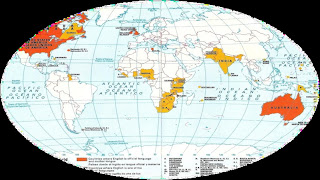There are many reason why English is the International language. In the first place, English with more than 370 millions of speakers is one of the most spread languages in the world because of different political and historical reasons such us the World War II. Then, Chinese is spoken by more than a billion people, Spanish by about 240 million people, Russian by 210 million, Portuguese by 125 million, German by 110 million, French by 85 million native speakers and Italian by 65 million. However, English is spoken in the most important countries in economic matters like United States.
In the second place, the rapid technological development of the countries where English is the first language. Most of the technological-scientific texts are written in English. Moreover, press, cinema, television and literature in English are available for everyone. In the last years, the internet appearance which is consider now the major source of dates, images and texts, has increased the relevance of English language.
English as a first and second language
There are many countries where English is the official language and mother tongue such as United Kingdom, United States and also Australia and New Zealand.Moreover, the English language expended because of the colonization of several African and Asian countries by England and more lately it continued because of the United States influence. So, in these countries, English is one of the official language a part of the own language like in India, Pakistan or Sri Lanka in Asia, and Kenya, Zambia, Liberia, Tanzania …in Africa. In these places, the English language is a hybrid language because it has the influence of the original language of the colonies so English language has a lot of varieties.



A part of the Known difference between American English and British English in lexical, (lift/elevator; lorry/truck, underground/subway), spelling and pronunciation level (Americans speak more slowly) there are another English language differences between Australia, Canada, New Zealand, South Africa and India speakers English.
In Australia the main difference is the accent and some words ending in –ie such as bikkie (biscuit), truckie (truck dirver). barbie (barbecue), bikkie (biscuit), cozzie (swimming costume), lippie (lipstick), mozzie (mosquito), surfie (surfboarder), truckie (truck driver).
New Zeland English is very similar to Australia English but there are some own words like bach (holiday`s house), togs (swimming suit), dairy (food shop), jandals (sandals). Moreover, the word Kiwi is the name of a fruit and a bird and it also means New Zealand.
In Canada the orthographic rules are similar to British English and the lexical is like in America. However, there are some exceptions in words like railway (railroad) , boot (trunk), bill (check), tap (faucet). Moreover, there are typical colloquial expressions, for example loonie or tonie to refert of one and two dollars coins respectively, and parkade (parking)
In South Africa many words are influenced of the African language, for example, robots (traffic lights), fundi (expert), padkos (travel food). Some words with African origin like aardvark, apartheid, township y trek now are incorporated in the universal English.
Finally in India there are many words like curry (curry), dungarees (jeans) and jodhpurs (riding clothes) that now are incorporated to the universal English language. There are some typical words like tiffin (picnic), crore (ten millions) y el uso de thrice (three times).
English as a foreign language
Nowadays English language is very important around the world so many people decide to study it, but we can`t know what may happen in the future. Now, we can learn English through two different ways:In the one hand, in an involuntary way because we learn English inconscient when we listen to music, watch television, advertising, art, cinema or search in internet.
In the other hand we learn English in a voluntary way because of different reason such as:
- Schools where is obligatory to study a second language a part of the own language;
- Progress, If you speak two o more languages a part from your native language, you can find a better job.
- Fr Specific Purposes like:
- Academic, many people want to study at the university in Britain, USA or Canada.
- Science and Technology, many works require to know English language because scientific and technologies text are written in English.
- Occupational, in many jobs you need to speak English because you dealing with people from other nationalities like traffic controllers, business executives and waiters.
- Culture because there are people who want to know the people, places and language of a different country.
- Miscellaneous, people who want to learn English because they have free time, they like travel or another motivations.
No hay comentarios:
Publicar un comentario